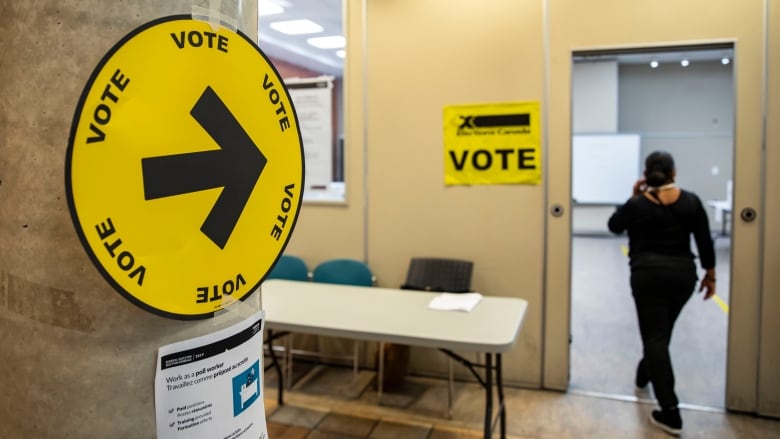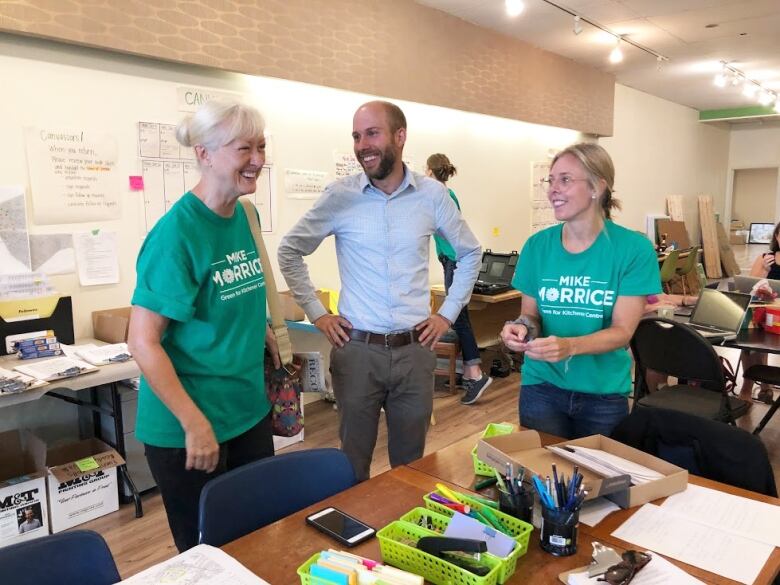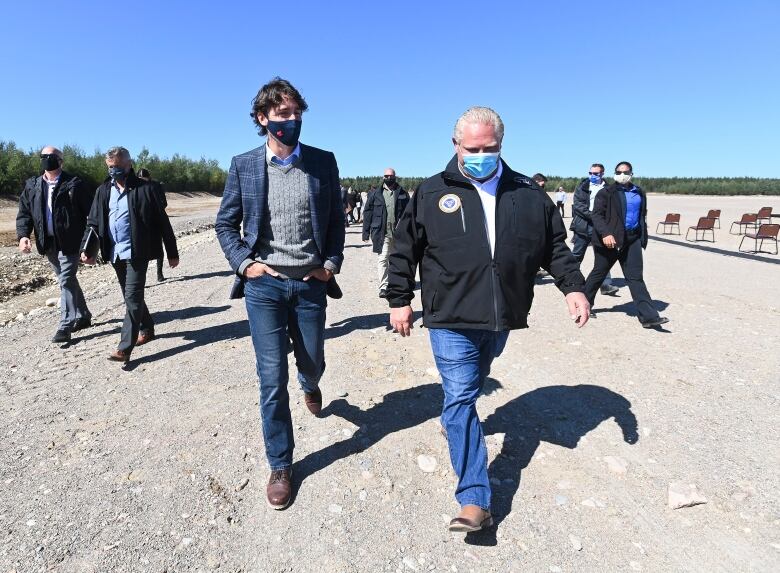As possible fall election looms, many voters in Waterloo region are still undecided
Close races, like Kitchener-Conestoga, likely to play a big role in next election, analyst says

With whispers of a possible federal election this fall, a newly released poll from researchers at Wilfrid Laurier University shows a third of people in Waterloo region are unsure who would get their vote.
When asked this past spring who they'd vote for in a federal election, the Laurier Institute for the Study of Public Opinion and Policy poll of 502 people found 28 per cent of those who responded said Liberal, 12 per cent said Conservative, nine per cent said NDP and eight per cent said Green.
But 33 per cent of the people polled were undecided.
Andrea Perella, an associate professor of political science at Laurier and a researcher with the institute, says undecided might not be quite the right word.
"They're in a state of suspension," he said. "They just don't pay any attention to it ... they don't care about the election."
He said many people are often "late to the party" when it comes to elections, meaning they start to pay attention when campaigning gets underway, and they really start paying attention in the last few weeks as headlines are dominated with election news, signs go up along streets and someone knocks on their door while canvassing.
"They often probably vote the same way they voted last time, but they're not as motivated. And I think that's what we're seeing in this area," he said.
The poll was done by landline, cellphone and online between March 10 and April 23. It has a margin of error of four percentage points.
Even though the poll was done more than two months ago, and some opinions may have changed, Perella says it's important to get a baseline to understand how local voters are feeling.
As well, he said, local polls are rare. Often during elections, polling looks at much larger centres, or the province or country as a whole. So to have this information on a local level, especially in the five ridings of Waterloo region which can be seen often as a bellwether predictor of what will happen across the country, is important.
Andrea Perrella broke down the findings of the poll on CBC K-W's The Morning Edition. Listen to the interview here:
Close ridings to play key role
There are expected to be tight races in Waterloo region, no matter when the next federal election takes place.
ric Grenier, a former polls analyst with the CBC's parliamentary bureau who now runs the website TheWrit, recently wrote on his website that ridings in the country where the winner was decided by a close margin in 2019 could decide the next election.
"It seems likely that the ridings that were closest in 2019 will play a big role in the next campaign," Grenier wrote in the June 25 post.
Among those close contests is Kitchener-Conestoga, currently held by Liberal Tim Louis.
In 2019, the winner in Kitchener-Conestoga wasn't known until the day after the election because the race was so close and some of the paperwork went missing for a brief period, which Elections Canada said was due to human error. Louis beat then incumbent Conservative Harold Albrecht, 20,106 votes to 19,833, or 39.6 per cent of the vote to 39.1 per cent.
In 2015, Albrecht beat Louis 20,648 votes to 20,297.

Other ridings to watch
Another riding in the region that will be hotly contested is Kitchener South-Hespeler. The riding was won in 2019 by incumbent Liberal MP Marwan Tabbara, who had 21,051 votes. The second place candidate was Alan Keeso for the Conservatives, who took 17,517 votes.
But Tabbara now sits as an independent MP after he said he stepped back from the Liberal caucus when he was charged in April 2020 with two counts of assault, one count of break-and-enter and commit an indictable offence and one count of criminal harassment. Tabbara's case remains before the court.
This past week, Valerie Bradford was nominated as the Liberal candidate in Kitchener South-Hespeler, removing any possibility of Tabbara running under the Liberal banner in the next election.
But Tabbara also has not ruled out running in this election, a spokesperson for the MP said Friday.
Also recently, Suresh Arangath wastapped as the NDP candidate in that riding. Meanwhile, Keeso announced in January he would not seek the nomination again, and as of yet, the Conservatives have not announced a candidate in the riding.
Waterloo MP Bardish Chagger, who is a Liberal cabinet minister, won her seat handily in 2019 with 48.7 per cent of the share of the vote, a slight drop from 50 per cent in 2015.
Cambridge Liberal MP Bryan May also won by a significant margin in 2019, getting 39.5 per cent of the vote ahead of runner-up Conservative Sunny Attwal with 30.2 per cent of the vote.
People will also have their eyes on the Kitchener Centre race, where the Green Party of Canada made strong gains in the 2019 election.

While candidate Mike Morrice came in second with 14,215 votes to Liberal incumbent Raj Saini's 20,014, Morrice's rise was noted. In the 2015 election, the Greens had garnered just 1,891 votes with the candidate coming in fourth with just four per cent of the vote share.
Morrice is back in for the Greens in the next federal election and he has pledged to build on the momentum from 2019.
Poll: How Trudeau and Ford handled the pandemic
Below are some of the other findings from the Laurier Institute for the Study of Public Opinion and Policy poll.
When asked how well Prime Minister Justin Trudeau handled the pandemic:

When asked how well Premier Doug Ford handled the pandemic:
- For those who voted Progressive Conservative in 2018, 61 per cent approved of how he handled the pandemic, 32 per cent disapproved and seven per cent neither approved nor disapproved.
- For people who voted NDP, 29 per cent approved of how the pandemic was handled, 64 per cent disapproved, and seven per cent neither approved nor disapproved.
- For people who voted Liberal, 56 per cent approved, 40 per cent disapproved, and four per cent neither approved nor disapproved.
- For people who voted Green, 38 per cent approved, 62 per cent disapproved.
- For those who did not vote, 34 per cent approved, 32 per cent disapproved and 34 per cent neither approved or disapproved.
When asked about the spring 2022 provincial election:
- 22 per cent said they'd vote Liberal.
- 18 per cent said they'd vote Progressive Conservative.
- 15 per cent said they'd vote NDP.
- Eight per cent said they'd vote Green.
- 38 per cent of respondents said they were undecided












_(720p).jpg)


 OFFICIAL HD MUSIC VIDEO.jpg)
.jpg)



























































































